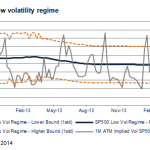Impact of Population Trends on Returns
Acceleration in the growth of retirees in the developed world, along with shrinkage in the proportion of the population in the high-savings age bracket, suggests that capital will become scarcer and therefore equity-market valuations will fall over coming years, says Barclays Capital in its latest annual study of investments.In the US the demographic model suggests that over the next five years average price/earnings ratios will fall to around 11 times (it’s currently above 16x), with values underperforming the growth in corporate profits. Shareholders, with increasing preference for income over capital gains, will demand higher dividend payout ratios.
Nevertheless, over the next decade, assuming a normal trend for profits, returns from equities should remain positive and much better than those from bonds.
In both the US and the UK, long-term government bond yields are set to more than double, moving up to around 10 per cent by 2020.
An unfavourable shift in the proportion of dependants in those countries’ populations, with sharply increased spending on pensions and healthcare, is likely to produce a sustained deterioration in government finances and a continuous increase in government debt relative to economic activity.
The overall impact of ageing of populations will be about 20 times greater than the recent credit crisis (which has cut into government revenues and boosted spending on social support such as unemployment benefits).
“The common assumption that future savings flows from the large developing economies will be a ready source of finance for the ageing advanced economies is most probably flawed…
“The projected trajectory for old age dependency ratios in countries like Brazil, China or Russia are as severe as in the US. It is highly implausible to believe that Africa, the Middle East and India will be capable of funding the rest of the world’s growing population of retirees,” says the study.
The impending shrinkage in the working-age population “may resurrect the risk of wage inflation, amplifying and sustaining the impact of any inflation shocks.” As labour forces in the developing world grow richer, their pay levels will become less of a restraint on wage levels in the advanced economies.
Also, “the stresses placed upon global commodity supplies are likely to intensify in the years ahead,” suggesting sustained increases in the real prices of raw materials, food and energy resources.
Although BarCap is markedly pessimistic about emerging-market equities this year, it remains upbeat on longer-term prospects, forecasting real total returns averaging 10½ per cent a year for foreign investors, allowing for currency gains, and for commodities, where it expects demand to outstrip supply.
CopyRight – OnTarget March 2011 by Martin Spring





